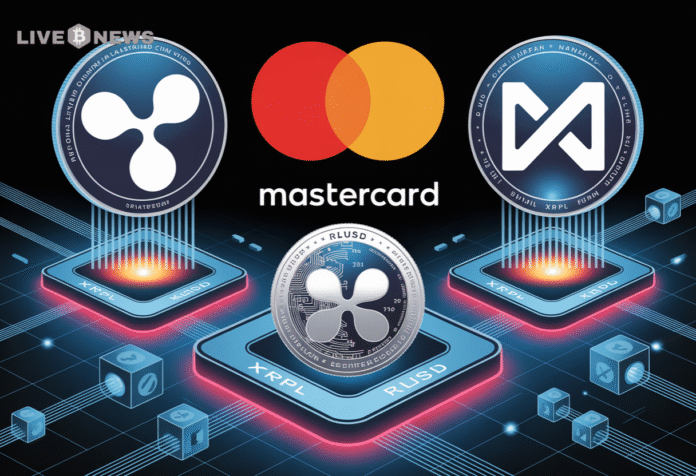Ripple, Mastercard, WebBank, and Gemini join forces to trial Ripple’s RLUSD stablecoin on the XRPL for settling traditional fiat card transactions.
A major financial technology shift is now underway. Ripple, a key crypto solutions firm, announced a massive new collaboration. This partnership consists of global payments company leader Mastercard, WebBank, and crypto exchange platform Gemini. Together, they will investigate the use of the Ripple USD (RLUSD) stablecoin for settlement of fiat card transactions. The powerful new initiative is set to bring a change in the back-end financial processes for major institutions.
Global Payments Network Adopts Regulated Digital Asset
The center of this initiative is focused on the XRPL. This public blockchain is well known for secure and incredibly fast payments. The new effort will allow RLUSD, which runs on the XRPL, to make these processes possible. This is specifically the flow of settlement between Mastercard and WebBank. Furthermore, this exploration will give key data on real-world stablecoin use cases.
WebBank serves as the vital investor of the popular Gemini Credit Card. The whole project is an expansion of an existing and successful partnership. Earlier this year, they were able to launch an XRP edition of the Gemini Credit Card successfully. This prior success served as a solid model for the use of digital assets in existing payment programs.
Related Reading: Ripple News: Ripple Hits $40 Billion Valuation After $500 Million Strategic Funding Round | Live Bitcoin News
Mastercard’s Global Head, Sherri Haymond, commented on the proactive move. She said they are bringing regulated open-loop stablecoin payments to the financial mainstream. Moreover, the company is driven by a very high commitment to consumer choice. They also uphold a principled approach to stablecoins, ensuring full compliance with the regulations.
The change will affect mainly only back-end operations. Therefore, consumers will not notice a difference in their existing checkout experience. However, the flow of money that is behind it will occur more quickly and will be much more efficient. This seamless integration of new technology is an important goal of the partnership.
This is a historic first for the institutional finance industry. It is one of the first partnerships involving a regulated U.S. bank settling traditional card transactions. This is an extremely important settlement based on a regulated stablecoin on a public blockchain. As a result, the project is emphasizing the growing institutional trust in digital assets worldwide.
RLUSD Stablecoin Secures Back-End Transactions with Speed
WebBank President and CEO Jason Lloyd emphasized the bank’s special role in this regard. He pointed out that banks have been able to link innovative blockchain technology with the security of conventional finance. This is a collaboration that enables critical exploration into more efficient institutional payments. Indeed, it promises to sustain expected security and reliable service to all customers.
Ripple President Monica Long gave her view on the future. She said financial institutions are now widely aware of blockchain and stablecoins for modernizing how money is moved. This partnership demonstrates RLUSD’s distinctiveness in improving settlement. Ultimately, this paves the way for other card programs to have compliant stablecoins for fast transactions.
Regulatory compliance is also an important area of focus for all partners. RLUSD is a well-regulated stablecoin. Standard Custody & Trust Company is the issuer of the coin. This company is an NYDFS Trust Company Charter-certified subsidiary of Ripple. Before going forward, the entire project awaits all necessary final regulatory approvals from the relevant authorities.
Lastly, RLUSD stablecoin is launched in December 2024. It has since grown rapidly to have significant and impressive scale. In fact, it has already hit the $1 billion-plus mark in circulation in a short period of time. The stablecoin is backed 1:1 by cash and cash equivalents, and this is critically important because it provides stability. The XRPL will be the core backbone for all these new institutional uses.





